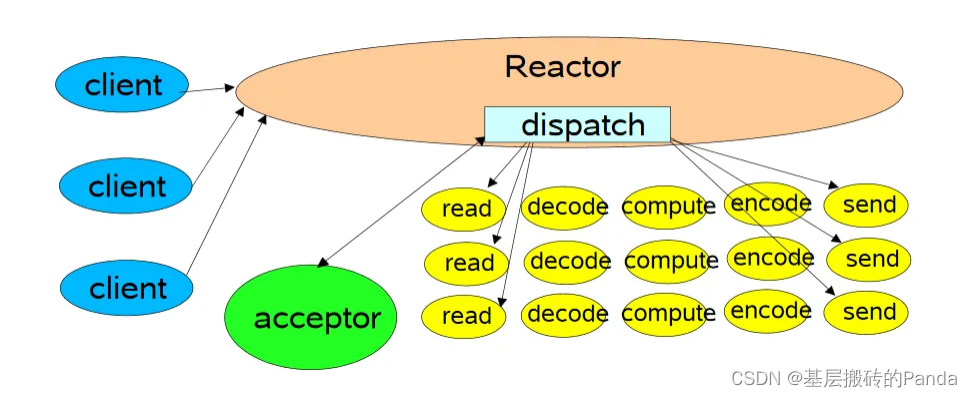引言
在Reactor (One eventLoop per thread)模型中,一次时间循环可以处理若干个事件,但是这些事件是串行处理的,一个任务若是执行时间过长,会延迟其他任务的处理,在客户端看来就是响应变慢了。线程池就是处理这种耗时场景的方案之一。

一、什么是线程池及作用
为了避免线程的频繁创建和销毁,提前准备好一定数量的线程,并管理起来,有任务就分配一个线程去执行,任务执行结束,不是销毁线程,而是放回到线程池,待下次有任务来继续执行。
作用:
- 实现了线程的复用
- 减少了线程创建和销毁的开销
- 减少多个任务(不是一个任务)的执行时间
二、线程池的应用场景
- 某类任务比较耗时,影响线程执行其他任务;
- 需要异步的执行某类任务;
三、线程池的接口设计
线程池是一个典型的生产者消费模型。有生产者、队列、消费者(线程池),其中队列用于解耦。
- 线程池的创建(线程数量和队列大小)
- 线程池的销毁(线程退出标志和通知所有线程)
- 添加任务(封装任务、入队、通知线程执行)
- 任务调度(mutex、condition)
3.1 线程数量如何确定(经验值)
根据耗时任务的类型,可以将任务分为:
- IO密集型,线程数量为: 2*n + 2(n为CPU核心数)
- CPU密集型 ,线程数量为:CPU核心数
四、线程池在Redis、Nginx中的应用
4.1 Redis中的线程池
Redis是内存数据库,读写数据嘎嘎快。线程池主要用在,读写 io 处理以及数据包解析、压缩部分。

4.2 Nginx中的线程池
Nginx线程池模型,主线程将任务加入任务队列,线程池取任务执行,执行完任务将结果存入完成消息队列,通知主线程获取任务执行结果。

Nginx做静态代理时,作用的位置如下:
五、完整代码示例
5.1 thread_pool.h
#ifndef _THREAD_POOL_H
#define _THREAD_POOL_H
typedef struct thread_pool_t thread_pool_t;
typedef void (*handler_pt) (void *);
thread_pool_t *thread_pool_create(int thrd_count, int queue_size);
int thread_pool_post(thread_pool_t *pool, handler_pt func, void *arg);
int thread_pool_destroy(thread_pool_t *pool);
int wait_all_done(thread_pool_t *pool);
#endif
5.2 thread_pool.h
#include <pthread.h>
#include <stdint.h>
#include <stddef.h>
#include <stdlib.h>
#include "thrd_pool.h"
typedef struct task_t {
handler_pt func;
void * arg;
} task_t;
typedef struct task_queue_t {
uint32_t head;
uint32_t tail;
uint32_t count;
task_t *queue;
} task_queue_t;
struct thread_pool_t {
pthread_mutex_t mutex;
pthread_cond_t condition;
pthread_t *threads;
task_queue_t task_queue;
int closed;
int started; // 当前运行的线程数
int thrd_count;
int queue_size;
};
static void * thread_worker(void *thrd_pool);
static void thread_pool_free(thread_pool_t *pool);
thread_pool_t *
thread_pool_create(int thrd_count, int queue_size) {
thread_pool_t *pool;
if (thrd_count <= 0 || queue_size <= 0) {
return NULL;
}
pool = (thread_pool_t*) malloc(sizeof(*pool));
if (pool == NULL) {
return NULL;
}
pool->thrd_count = 0;
pool->queue_size = queue_size;
pool->task_queue.head = 0;
pool->task_queue.tail = 0;
pool->task_queue.count = 0;
pool->started = pool->closed = 0;
pool->task_queue.queue = (task_t*)malloc(sizeof(task_t)*queue_size);
if (pool->task_queue.queue == NULL) {
// TODO: free pool
return NULL;
}
pool->threads = (pthread_t*) malloc(sizeof(pthread_t) * thrd_count);
if (pool->threads == NULL) {
// TODO: free pool
return NULL;
}
int i = 0;
for (; i < thrd_count; i++) {
if (pthread_create(&(pool->threads[i]), NULL, thread_worker, (void*)pool) != 0) {
// TODO: free pool
return NULL;
}
pool->thrd_count++;
pool->started++;
}
return pool;
}
int
thread_pool_post(thread_pool_t *pool, handler_pt func, void *arg) {
if (pool == NULL || func == NULL) {
return -1;
}
task_queue_t *task_queue = &(pool->task_queue);
if (pthread_mutex_lock(&(pool->mutex)) != 0) {
return -2;
}
if (pool->closed) {
pthread_mutex_unlock(&(pool->mutex));
return -3;
}
if (task_queue->count == pool->queue_size) {
pthread_mutex_unlock(&(pool->mutex));
return -4;
}
task_queue->queue[task_queue->tail].func = func;
task_queue->queue[task_queue->tail].arg = arg;
task_queue->tail = (task_queue->tail + 1) % pool->queue_size;
task_queue->count++;
if (pthread_cond_signal(&(pool->condition)) != 0) {
pthread_mutex_unlock(&(pool->mutex));
return -5;
}
pthread_mutex_unlock(&(pool->mutex));
return 0;
}
static void
thread_pool_free(thread_pool_t *pool) {
if (pool == NULL || pool->started > 0) {
return;
}
if (pool->threads) {
free(pool->threads);
pool->threads = NULL;
pthread_mutex_lock(&(pool->mutex));
pthread_mutex_destroy(&pool->mutex);
pthread_cond_destroy(&pool->condition);
}
if (pool->task_queue.queue) {
free(pool->task_queue.queue);
pool->task_queue.queue = NULL;
}
free(pool);
}
int
wait_all_done(thread_pool_t *pool) {
int i, ret=0;
for (i=0; i < pool->thrd_count; i++) {
if (pthread_join(pool->threads[i], NULL) != 0) {
ret=1;
}
}
return ret;
}
int
thread_pool_destroy(thread_pool_t *pool) {
if (pool == NULL) {
return -1;
}
if (pthread_mutex_lock(&(pool->mutex)) != 0) {
return -2;
}
if (pool->closed) {
thread_pool_free(pool);
return -3;
}
pool->closed = 1;
if (pthread_cond_broadcast(&(pool->condition)) != 0 ||
pthread_mutex_unlock(&(pool->mutex)) != 0) {
thread_pool_free(pool);
return -4;
}
wait_all_done(pool);
thread_pool_free(pool);
return 0;
}
static void *
thread_worker(void *thrd_pool) {
thread_pool_t *pool = (thread_pool_t*)thrd_pool;
task_queue_t *que;
task_t task;
for (;;) {
pthread_mutex_lock(&(pool->mutex));
que = &pool->task_queue;
// 虚假唤醒 linux pthread_cond_signal
// linux 可能被信号唤醒
// 业务逻辑不严谨,被其他线程抢了该任务
while (que->count == 0 && pool->closed == 0) {
// pthread_mutex_unlock(&(pool->mutex))
// 阻塞在 condition
// ===================================
// 解除阻塞
// pthread_mutex_lock(&(pool->mutex));
pthread_cond_wait(&(pool->condition), &(pool->mutex));
}
if (pool->closed == 1) break;
task = que->queue[que->head];
que->head = (que->head + 1) % pool->queue_size;
que->count--;
pthread_mutex_unlock(&(pool->mutex));
(*(task.func))(task.arg);
}
pool->started--;
pthread_mutex_unlock(&(pool->mutex));
pthread_exit(NULL);
return NULL;
}
5.2 main.c
#include <stdio.h>
#include <stdlib.h>
#include <pthread.h>
#include <unistd.h>
#include "thrd_pool.h"
int nums = 0;
int done = 0;
pthread_mutex_t lock;
void do_task(void *arg) {
usleep(10000);
pthread_mutex_lock(&lock);
done++;
printf("doing %d task\n", done);
pthread_mutex_unlock(&lock);
}
int main(int argc, char **argv) {
int threads = 8;
int queue_size = 256;
if (argc == 2) {
threads = atoi(argv[1]);
if (threads <= 0) {
printf("threads number error: %d\n", threads);
return 1;
}
} else if (argc > 2) {
threads = atoi(argv[1]);
queue_size = atoi(argv[1]);
if (threads <= 0 || queue_size <= 0) {
printf("threads number or queue size error: %d,%d\n", threads, queue_size);
return 1;
}
}
thread_pool_t *pool = thread_pool_create(threads, queue_size);
if (pool == NULL) {
printf("thread pool create error!\n");
return 1;
}
while (thread_pool_post(pool, &do_task, NULL) == 0) {
pthread_mutex_lock(&lock);
nums++;
pthread_mutex_unlock(&lock);
}
printf("add %d tasks\n", nums);
wait_all_done(pool);
printf("did %d tasks\n", done);
thread_pool_destroy(pool);
return 0;
}






















 153
153











 被折叠的 条评论
为什么被折叠?
被折叠的 条评论
为什么被折叠?








